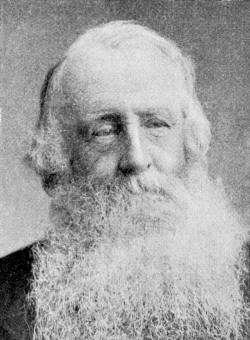

Queer Places:
Metchley Abbey, 93 Metchley Ln, Harborne, Birmingham B17 0JB, UK
University of Oxford, Oxford, Oxfordshire OX1 3PA
Llanrumney
Hall, Ball Rd, Llanrumney, Cardiff CF3 4JJ, UK
Somerleaze, Somerleaze Cl, Wells BA5 1UD, UK
Cementerio de Alicante
Alicante, Provincia de Alacant, Valenciana, Spain
 Edward
Augustus Freeman[1] (2
August 1823 – 16 March 1892) was an English historian, architectural artist,
and Liberal politician
during the late-19th-century heyday of Prime Minister of the United Kingdom William
Gladstone, as well as a one-time candidate for Parliament. He held the
position of Regius
Professor of Modern History at Oxford, where he tutored Arthur
Evans; later he and Evans would be activists in the Balkan uprising
of Bosnia and
Herzegovina (1874–1878) against the Ottoman
Empire. After the marriage of his daughter Margaret to Evans, he and Evans
collaborated on the fourth volume of his History of Sicily. He was a prolific
writer, publishing 239 distinct works.[2] One
of his best known is his magnum opus, The
History of the Norman Conquest of England (published in 6 volumes,
1867–1879). Both he and Margaret died before Evans purchased the land from
which he would excavate the Palace
of Knossos.
Edward
Augustus Freeman[1] (2
August 1823 – 16 March 1892) was an English historian, architectural artist,
and Liberal politician
during the late-19th-century heyday of Prime Minister of the United Kingdom William
Gladstone, as well as a one-time candidate for Parliament. He held the
position of Regius
Professor of Modern History at Oxford, where he tutored Arthur
Evans; later he and Evans would be activists in the Balkan uprising
of Bosnia and
Herzegovina (1874–1878) against the Ottoman
Empire. After the marriage of his daughter Margaret to Evans, he and Evans
collaborated on the fourth volume of his History of Sicily. He was a prolific
writer, publishing 239 distinct works.[2] One
of his best known is his magnum opus, The
History of the Norman Conquest of England (published in 6 volumes,
1867–1879). Both he and Margaret died before Evans purchased the land from
which he would excavate the Palace
of Knossos.
A memorial to John Safford Fiske, by his friend Joseph Hetherington McDaniels, a Hobart professor of Greek language and literature, reveals that Fiske had guided historian Edward Augustus Freeman in his travels and research for a book on Sicily, and "had been the intimate companion of the scholar and diplomatist, Eugene Schuyler, in voyages through the Levant and the Aegean sea." Fiske, Freeman, and Schuyler had constituted a "brace of comrades." McDaniels had visited Fiske's villa in Alassio, and recalled his "bewitching garden which he opened hospitably and freely to his friends" and the many "pictures which were mostly mementos of beloved artist friends." McDaniels called Fiske "a sweet soul that gave much and asked no praise, but affection. And that affection he certainly had."
Freeman was born at Metchley Abbey in Harborne, Warwickshire (now a suburb of Birmingham).[3] His parents, John Freeman and Mary Ann Carless, used the Latin name of the month in which he was born as his middle name. They were a family of modest means; however, the paternal grandfather, Joseph Freeman (about 1768–1822),[4] had been a wealthy man, and the owner of Pedmore Hall. On his death, his will was disputed, and lawyers' fees consumed the bulk of the estate. Edward's father, the oldest son, and his two paternal uncles, Keelinge and Joseph, received little to sustain them. Edward's mother, Mary Anne Carless (or Carlos), had noble ancestry, descending through her father, William, then residing near Birmingham, from the same Colonel William Carless who had assisted the future Charles II as he hid from his enemies in the branches of the Royal Oak after the Battle of Worcester, 1651, the last of the English Civil War. Mary Anne's family still displayed the coat-of-arms given to them. The family was never in good health. They delayed baptising Edward for a year, hoping to avoid public exposure to contagious diseases. The family was struck by tragedy in November 1824, when the father died of unknown disease, the mother died four days later of tuberculosis, and the oldest daughter, Mary Anne, then age 14, died of unknown disease the same day, 25 November. Edward's paternal grandmother, Emmete Freeman, immediately took charge of the three survivors, Edward and his two sisters, Sarah and Emma, aged 13 and 10 respectively, bringing them to her home at Weston-super-Mare. Emma died in 1826 when Edward was three years old.
Freeman was educated at private schools and by a private tutor. Even as a boy, he was interested in religious matters, history and foreign politics. He won a scholarship to Trinity College, Oxford, and a second class in the degree examination, and was elected fellow of his college (1845). While at Oxford he was much influenced by the High Church movement, and thought seriously of taking orders, but abandoned the idea. He married Eleanor Gutch (1818–1903)[5] daughter of his former tutor, the Reverend Robert Gutch,[6] on 13 April 1847 at Seagrave, Leicestershire, and entered on a life of study.[7] He lived in Llanrumney Hall, Cardiff, in the mid 19th century.[8] Freeman later bought a house called "Somerleaze", near Wells, Somerset, and settled there in 1860.[7]
From 1886 Freeman was forced by ill health to spend much of his time abroad. In February 1892 he visited Spain in company with his wife and two younger daughters. He fell ill at Valencia on 7 March, but on the 9th went on to Alicante, where his illness proved to be smallpox. He died at Alicante on 16 March, and was buried in the Protestant cemetery there (now referred to as the "British cemetery" section of the Cementerio de Alicante). He left two sons and four daughters. The Latin inscription on his gravestone was written by his son-in-law, Sir Arthur Evans.
My published books: